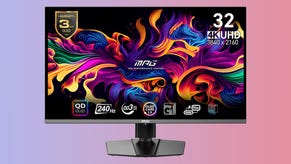Nvidia GeForce RTX 4070 review: an RTX 3080 challenger for $599
A solid 1440p upgrade - but Cyberpunk 2077 RT Overdrive hints at something more.
So far, the RTX 4070 has delivered decent performance for its price-point, but as a more general trend, we are not seeing the vast gen-on-gen increases in frame-rates we saw with the 30-series cards. The RTX 3070 matched 2080 Ti - a top-tier product - while the 4070 is battling it out with the next rung down instead, usually in the same ballpark, sometimes soundly beaten, other times significantly faster. It's only with frame generation that we see big, big leaps in frame-rates - but whether that equates to an actual performance boost beyond its appearance is still hotly debated. That is all based on results predominantly using ray tracing and reconstruction, so how about straight rasterisation? This should bring the RX 6800 XT directly into play, for starters.
Owing to the way users may be jumping around our benchmarking pages, you may be missing out on an explainer of how our benchmarking system presents. Our system offers a number of ways to get to the data you want, the presentation varying according to the device you're using. You'll get a basic overview of our findings on mobile, with metadata from the video capture of each GPU being translated into simple bar charts with average frame-rate and lowest one per cent measurements for easy comparisons.
On a desktop-class browser, you'll get the full-fat DF experience with embedded YouTube videos of each test scene and live performance metrics. Play the video, and you'll see exactly how each card handled the scene as it progresses. Below the real-time metrics is an interactive bar chart, which you can mouse over to see different measurements and click to switch between actual frame-rates and percentage differences. All the data here is derived from video captured directly from each GPU, ensuring an accurate replay of real performance.
Control
As the 'corridor of doom' is such a demanding area of Remedy's Control, we've relocated our rasterisation benchmark to the same area because it turns out that it's not the RT element that makes this place so demanding - it's inherent to the whole game. First up, an explanation for the weird RTX 4090 result at 1080p resolution. Pretty much from start to finish, the game sits at its 240fps limit, causing massive frame-time fluctuations, delivering those startling lowest one percent and five percent scores.
At 1440p, there's still the big disparity between RTX 4070 and RTX 3080 performance, with the old card running noticeably faster with a 12 percentage point lead - with the gap expanding dramatically at 4K (though seriously, you should be using DLSS there - the quality mode looks better than native resolution rendering). And as you might expect, bearing in mind that RT is now out of the equation, the RX 6800 XT is in play, inching ahead of the 4070's throughput.
The 4070 still delivers huge, huge improvements over the Turing-class cards, but the generational leap from 20 series is less pronounced with RT out of the picture: we're now looking at a circa 61 percent boost to performance compared to the RTX 2070 Super, rising to 83 percent up against the RTX 2070. If you're looking to spend more to get more, the RTX 4070 Ti MSRP is 33 percent higher, delivering around 27 percent more performance - though that increases to 31 percent at 4K resolution.
Control, High, 4x MSAA
Cyberpunk 2077
This benchmark is the same as our RT-based runs, based on a streaming system in-game test devised by CD Projekt RED itself and still present in the code - it consists of a scripted high-speed tour around Night City. While Control was previously our record holder for the title that caused the RTX 4070 the most trouble, the non-RT run in CP2077 beats it into a cocked hat.
Here, we find the RTX 4070 effectively sitting in the middle ground between RTX 3070 and RTX 3080 - indeed, the new card is only 13 percentage points faster than its 30-series namesake. The gaps close at 1080p, but become wider still at 4K resolution - though at that point, you will be using DLSS owing to the poor overall performance. The RX 6800 XT is generally slower than the RTX 3080 and that's the case here too, but it still delivers a circa 10-point lead over the RTX 4070.
The disappointing showing here has a knock-on effect to the RTX 20-series comparisons - the new card is around 70 percent faster than an RTX 2070 at 1440p, but the gap shrinks to around 42 percent up against the 2070 Super. This is a far cry from the much larger boosts to frame-rate delivered with RT active.
Cyberpunk 2077, Ultra, TAA
Forza Horizon 5
New architectures can throw out a bunch of outlier results that don't particularly flatter newer products in some scenarios, but there can be another kind of outlier result that favours new products and based on our prior RTX 40-series reviews, Forza Horizon 5 runs exceptionally well on Ada Lovelace. We're seeing that here, where the RTX 4070 delivers a 10 percentage point lead over the RTX 3080.
This is a game that has historically favoured AMD until the Ada cards arrived, but even so, the RX 6800 XT acquits itself extremely well here. It's fast, a touch faster than the 4070, with a two percentage point lead.
There's a correspondingly nice improvement over Nvidia's Turing offerings from the RTX 20-series line, meaning you're getting a welcome 1.8x performance increase up against the 2070 Super, rising to a 2.2x boost against RTX 2070.
Forza Horizon 5, Extreme, 4x MSAA
F1 22
After the excellent Forza Horizon 5 result, we're returning to the more established trend seen so far from rasterisation as we take a look at Codemasters F1 22, running at ultra high settings but with all RT options disabled. There's an interesting lack of scalability at 1440p as we scale up across the Ada cards - the RTX 4090 is only 83 percent faster for 2.7 times the cost - but once again the RTX 3080 carves out a lead, albeit a relatively small one at around six percent.
Again, shorn of RT features, this gives AMD hardware a chance to shine and the RX 6800 XT does not disappoint. It outpaces RTX 3080 in this title at these settings with a 10 percentage point lead - and that rises to 15 percent against the new 4070.
It's the comparisons against RTX 20-series cards of a similar class that are likely to be the more useful data point as an RTX 4070 is more likely to be purchased by existing owners of the 2070 and 2070 Super. Here, you're getting an 83 percentage point boost over the non-Super 2070, dropping to 64 percent if you're Supered up.
F1 22, Ultra, TAA
Nvidia GeForce RTX 4070 analysis
- Introduction, hardware and power analysis
- RT benchmarks: Dying Light 2, Cyberpunk 2077, Control, F1 22
- RT benchmarks: Hitman 3, Metro Exodus Enhanced Edition, Marvel's Spider-Man: Miles Morales
- RT/DLSS/FSR2/DLSS3 benchmarks: Cyberpunk 2077, Dying Light 2, Forza Horizon 5, Marvel's Spider-Man: Miles Morales
- Game benchmarks: Control, Cyberpunk 2077, F1 22, Forza Horizon 5 [This Page]
- Game benchmarks: Hitman 3, Marvel's Spider-Man: Miles Morales, A Plague Tale: Requiem, Returnal
- Nvidia GeForce RTX 4070: the Digital Foundry verdict








